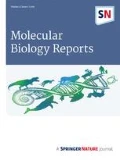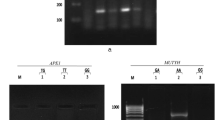Abstract
In the present study we investigated the association between three polymorphisms of the MUTYH (Tyr165Cys, rs34612342), the OGG1 (Ser326Cys, rs1052133) and the XPD (Lys751Gln, rs13181) genes with head and neck cancer risk. Genotypes were determined in DNA from peripheral blood lymphocytes of 265 patients with head and neck squamous cell carcinoma (HNSCC) as well as 280 cancer-free controls by PCR-restriction fragment lenght polymorphisms. We found an association between HNSCC and the Ser326Cys (OR 1.69; 95% CI 1.19–2.45) as well as Cys326Cys (OR 4.56; 95% CI 2.07–10.05) variants of the OGG1 gene. The gene–gene interaction between MUTYH and OGG1 as well as OGG1 and XPD polymorphic variants may contribute to higher prevalence of HNSCC. We also found an association between Ser326Cys and Cys326Cys variants of OGG1 gene and smoking status in HNSCC patients (OR 1.97; 95% CI 1.25–3.11), (OR 3.54; 95% CI 1.39–9.04), respectively. Moreover, we also observed a protective association between Tyr165Cys variant of the MUTYH gene and non-smoking status in HNSCC (OR 0.34; 95% CI 0.17–0.66). We also found a link between gene–gene interaction (MUTYH and OGG1 or OGG1 and XPD) and smoking (ORs 2.17–4.20 and 2.18–5.23) or non-smoking status (ORs 0.11 and 7.61) in HNSCC patients, respectively. In conclusion our data showed that the Ser326Cys polymorphism of the OGG1 gene may modify the risk of HNSCC associated with smoking. Finally we suggested that this polymorphism might be used as predictive factor for head and neck cancer in Polish population.
Similar content being viewed by others
References
Jemal A, Tiwari RC, Murray T, Ghafoor A, Samuels A, Ward E, Feuer EJ, Thun MJ (2004) American Cancer Society. Cancer statistics. CA Cancer J Clin 54:8–29
Parkin DM, Pisani P, Ferlay J (1993) Estimates of the worldwide incidence of eighteen major cancers in 1985. Int J Cancer 54:594–606
Gupta PC, Murti PR, Bhonsle RB (1996) Epidemiology of cancer by tobacco products and its significance of TSNA. Crit Rev Toxicol 26:83–98
Morawiec-Sztandera A, Zimmer-Nowicka J, Kaczmarczyk D, Niedźwiecka I (2008) Use of tissue autofluorescence in the diagnostics and assessment of treatment efficacy of the head and neck cancer. Otolaryngol Pol 62:540–544
Crowe DL (2002) Molecular pathology of head and neck cancer. Histol Histopathol 17:909–914
Vassallo R, Kroening PR, Parambil J, Kita H (2008) Nicotine and oxidative cigarette smoke constituents induce immune-modulatory and pro-inflammatory dendritic cell responses. Mol Immunol 45:3321–3329
Valko M, Rhodes CJ, Moncol J, Izakovic M, Mazur M (2006) Free radicals, metals and antioxidants in oxidative stress-induced cancer. Chem Biol Interact 160:1–40
Hoeijmakers JH (1993) Nucleotide excision repair. II: From yeast to mammals. Trends Genet 9:211–217
Popanda O, Schattenberg T, Phong CT, Butkiewicz D, Risch A, Edler L, Kayser K, Dienemann H, Schulz V, Drings P, Bartsch H, Schmezer P (2004) Specific combinations of DNA repair gene variants and increased risk for non-small cell lung cancer. Carcinogenesis 25:2433–2441
Yu Z, Chen J, Ford BN, Brackley ME, Glickman BW (1999) Human DNA repair systems: an overview. Environ Mol Mutagen 33:3–20
Wood RD, Mitchell M, Sgouros J, Lindahl T (2001) Human DNA repair genes. Science 291:1284–1289
Kowalski M, Przybylowska K, Rusin P, Olszewski J, Morawiec-Sztandera A, Bielecka-Kowalska A, Pietruszewska W, Mlynarski W, Janusz S, Majsterek I (2009) Genetic polymorphisms in DNA base excision repair gene XRCC1 and the risk of squamous cell carcinoma of the head and neck. J Exp Clin Cancer Res 13:28–37
Tse D, Zhai R, Zhou W, Heist RS, Asomaning K, Su L, Lynch TJ, Wain JC, Christiani DC, Liu G (2008) Polymorphisms of the NER pathway genes, ERCC1 and XPD are associated with esophageal adenocarcinoma risk. Cancer Causes Control 19:1077–1083
Liu G, Zhou W, Yeap BY, Su L, Wain JC, Poneros JM, Nishioka NS, Lynch TJ, Christiani DC (2007) XRCC1 and XPD polymorphisms and esophageal adenocarcinoma risk. Carcinogenesis 28:1254–1258
Lee YC, Morgenstern H, Greenland S, Tashkin DP, Papp J, Sinsheimer J, Cao W, Hashibe M, You NC, Mao JT, Cozen W, Mack TM, Zhang ZF (2008) A case-control study of the association of the polymorphisms and haplotypes of DNA ligase I with lung and upper-aerodigestive-tract cancers. Int J Cancer 122:1630–1638
Marra G, Jiricny J (2003) Multiple colorectal adenomas–Is their number up? N Engl J Med 348:845–847
Elahi A, Zheng Z, Park J, Eyring K, McCaffrey T, Lazarus P (2002) The human OGG1 DNA repair enzyme and its association with orolaryngeal cancer risk. Carcinogenesis 23:1229–1234
Dherin C, Radicella JP, Dizdaroglu M, Boiteux S (1999) Excision of oxidatively damaged DNA bases by the human alpha-hOgg1 protein and the polymorphic alpha-hOgg1 (Ser326Cys) protein which is frequently found in human populations. Nucleic Acids Res 27:4001–4007
Nakabeppu Y, Tsuchimoto D, Furuichi M, Sakumi K (2004) The defense mechanisms in mammalian cells against oxidative damage in nucleic acids and their involvement in the suppression of mutagenesis and cell death. Free Radic Res 38:423–429
Tao H, Shinmura K, Suzuki M, Kono S, Mibu R, Tanaka M, Kakeji Y, Maehara Y, Okamura T, Ikejiri K, Futami K, Yasunami Y, Maekawa T, Takenaka K, Ichimiya H, Imaizumi N, Sugimura H (2008) Association between genetic polymorphisms of the base excision repair gene MUTYH and increased colorectal cancer risk in a Japanese population. Cancer Sci 99:355–360
Lehmann AR (2001) The xeroderma pigmentosum group D (XPD) gene: one gene, two functions, three diseases. Genes Dev 15:15–23
Hemminki K, Xu G, Angelini S, Snellman E, Jansen CT, Lambert B, Hou SM (2001) XPD exon 10 and 23 polymorphisms and DNA repair in human skin in situ. Carcinogenesis 22:1185–1188
Au WW, Salama SA, Sierra-Torres CH (2003) Functional characterization of polymorphisms in DNA repair genes using cytogenetic challenge assays. Environ Health Perspect 111:1843–1850
Lunn RM, Helzlsouer KJ, Parshad R, Umbach DM, Harris EL, Sanford KK, Bell DA (2000) XPD polymorphisms: effects on DNA repair proficiency. Carcinogenesis 21:551–555
Stern MC, Siegmund KD, Conti DV, Corral R, Haile RW (2006) XRCC1, XRCC3, and XPD polymorphisms as modifiers of the effect of smoking and alcohol on colorectal adenoma risk. Cancer Epidemiol Biomarkers Prev 15:2384–2390
Hansen RD, Sørensen M, Tjønneland A, Overvad K, Wallin H, Raaschou-Nielsen O, Vogel U (2007) XPA A23G, XPC Lys939Gln, XPD Lys751Gln and XPD Asp312Asn polymorphisms, interactions with smoking, alcohol and dietary factors, and risk of colorectal cancer. Mutat Res 619:68–80
Buch S, Zhu B, Davis AG, Odom D, Siegfried JM, Grandis JR, Romkes M (2005) Association of polymorphisms in the cyclin D1 and PD genes and susceptibility to cancers of the upper aero-digestive tract. Mol Carcinog 42:222–228
Piccioli P, Serra M, Gismondi V, Pedemonte S, Loiacono F, Lastraioli S, Bertario L, De Angioletti M, Varesco L, Notaro R (2006) Multiplex tetra-primer amplification refractory mutation system PCR to detect 6 common germline mutations of the MUTYH gene associated with polyposis and colorectal cancer. Clin Chem 52:739–743
Barnes DE, Lindahl T (2004) Repair and genetic consequences of endogenous DNA base damage in mammalian cells. Annu Rev Genet 38:445–476
Krokan HE, Nilsen H, Skorpen F, Otterlei M, Slupphaug G (2000) Base excision repair of DNA in mammalian cells. FEBS Lett 476:73–77
Nohmi T, Kim SR, Yamada M (2005) Modulation of oxidative mutagenesis and carcinogenesis by polymorphic forms of human DNA repair enzymes. Mutat Res 591:60–73
Arcand SL, Provencher D, Mes-Masson AM, Tonin PN (2005) OGG1 Cys326 variant, allelic imbalance of chromosome band 3p25.3 and TP53 mutations in ovarian cancer. Int J Oncol 27:1315–1320
Sugimura H, Kohno T, Wakai K, Nagura K, Genka K, Igarashi H, Morris BJ, Baba S, Ohno Y, Gao C, Li Z, Wang J, Takezaki T, Tajima K, Varga T, Sawaguchi T, Lum JK, Martinson JJ, Tsugane S, Iwamasa T, Shinmura K, Yokota J (1999) hOGG1 Ser326Cys polymorphism and lung cancer susceptibility. Cancer Epidemiol Biomarkers Prev 8:669–674
Xing DY, Tan W, Song N, Lin DX (2001) Ser326Cys polymorphism in hOGG1 gene and risk of esophageal cancer in a Chinese population. Int J Cancer 95:140–143
Xu J, Zheng SL, Turner A, Isaacs SD, Wiley KE, Hawkins GA, Chang BL, Bleecker ER, Walsh PC, Meyers DA, Isaacs WB (2002) Associations between hOGG1 sequence variants and prostate cancer susceptibility. Cancer Res 62:2253–2257
Monteiro E, Varzim G, Silva R, da Costa B, Lopes C (2005) Polymorphisms of the human OGG1 gene in laryngeal cancer: implications in radiotherapy response and survival. Rev Laryngol Otol Rhinol (Bord) 126:135–140
Takezaki T, Gao CM, Wu JZ, Li ZY, Wang JD, Ding JH, Liu YT, Hu X, Xu TL, Tajima K, Sugimura H (2002) hOGG1 Ser(326)Cys polymorphism and modification by environmental factors of stomach cancer risk in Chinese. Int J Cancer 99:624–627
Tsukino H, Hanaoka T, Otani T, Iwasaki M, Kobayashi M, Hara M, Natsukawa S, Shaura K, Koizumi Y, Kasuga Y, Tsugane S (2004) hOGG1 Ser326Cys polymorphism, interaction with environmental exposures, and gastric cancer risk in Japanese populations. Cancer Sci 95:977–983
Vogel U, Olsen A, Wallin H, Overvad K, Tjønneland A, Nexø BA (2004) No association between OGG1 Ser326Cys and risk of basal cell carcinoma. Cancer Epidemiol Biomarkers Prev 13:1680–1681
Hashimoto T, Uchida K, Okayama N, Imate Y, Suehiro Y, Hamanaka Y, Ueyama Y, Yamashita H, Hinoda Y (2005) Interaction of OGG1 Ser326Cys polymorphism with cigarette smoking in head and neck squamous cell carcinoma. Mol Carcinog 45:344–348
Pawlowska E, Janik-Papis K, Rydzanicz M, Zuk K, Kaczmarczyk D, Olszewski J, Szyfter K, Blasiak J, Morawiec-Sztandera A (2009) The Cys326 allele of the 8-oxoguanine DNA N-glycosylase 1 gene as a risk factor in smoking- and drinking-associated larynx cancer. Tohoku J Exp Med 219:269–275
Stanczyk M, Sliwinski T, Cuchra M, Zubowska M, Bielecka-Kowalska A, Kowalski M, Szemraj J, Mlynarski W, Majsterek I (2010) The association of polymorphisms in DNA base excision repair genes XRCC1, OGG1 and MUTYH with the risk of childhood acute lymphoblastic leukemia. Mol Biol Rep. doi:10.1007/s11033-010-0127-x
Sliwinski T, Markiewicz L, Rusin P, Pietruszewska W, Olszewski J, Morawiec-Sztandera A, Mlynarski W, Majsterek I (2009) Polymorphisms of the DNA base excision repair gene MUTYH in head and neck cancer. Exp Oncol 31:57–59
Görgens H, Müller A, Krüger S, Kuhlisch E, König IR, Ziegler A, Schackert HK, Eckelt U (2007) Analysis of the base excision repair genes MTH1, OGG1 and MUTYH in patients with squamous oral carcinomas. Oral Oncol 43:791–795
Li C, Hu Z, Liu Z, Wang LE, Strom SS, Gershenwald JE, Lee JE, Ross MI, Mansfield PF, Cormier JN, Prieto VG, Duvic M, Grimm EA, Wei Q (2006) Polymorphisms in the DNA repair genes XPC, XPD, and XPG and risk of cutaneous melanoma: a case-control analysis. Cancer Epidemiol Biomarkers Prev 15:2526–2532
Lunn RM, Langlois RG, Hsieh LL, Thompson CL, Bell DA (1999) XRCC1 polymorphisms: effects on aflatoxin B1-DNA adducts and glycophorin A variant frequency. Cancer Res 59:2557–2561
Spitz MR, Wu X, Wang Y, Wang LE, Shete S, Amos CI, Guo Z, Lei L, Mohrenweiser H, Wei Q (2001) Modulation of nucleotide excision repair capacity by XPD polymorphisms in lung cancer patients. Cancer Res 61:1354–1357
Benhamou S, Sarasin A (2002) ERCC2/XPD gene polymorphisms and cancer risk. Mutagenesis 17:463–469
Xing D, Qi J, Miao X, Lu W, Tan W, Lin D (2002) Polymorphisms of DNA repair genes XRCC1 and XPD and their associations with risk of esophageal squamous cell carcinoma in a Chinese population. Int J Cancer 100:600–605
Shi Q, Wang LE, Bondy ML, Brewster A, Singletary SE, Wei Q (2004) Reduced DNA repair of benzo[a]pyrene diol epoxideinduced adducts and common XPD polymorphisms in breast cancer patients. Carcinogenesis 25:1695–1700
Hu JJ, Hall MC, Grossman L, Hedayati M, McCullough DL, Lohman K, Case LD (2004) Deficient nucleotide excision repair capacity enhances human prostate cancer risk. Cancer Res 64:1197–1201
Benhamou S, Sarasin A (2005) ERCC2/XPD gene polymorphisms and lung cancer: a HuGE review. Am J Epidemiol 161:1–14
Hill JW, Evans MK (2006) Dimerization and opposite base-dependent catalytic impairment of polymorphic S326C OGG1 glycosylase. Nucleic Acids Res 34:1620–1632
Ye W, Kumar R, Bacova G, Lagergren J, Hemminki K, Nyren O (2006) The XPD 751Gln allele is associated with an increased risk for esophageal adenocarcinoma: a population-based case-control study in Sweden. Carcinogenesis 27:1835–1841
Casson AG, Zheng Z, Evans SC, Veugelers PJ, Porter GA, Guernsey DL (2005) Polymorphisms in DNA repair genes in the molecular pathogenesis of esophageal (Barrett) adenocarcinoma. Carcinogenesis 26:1536–1541
Ferguson HR, Wild CP, Anderson LA, Murphy SJ, Johnston BT, Murray LJ, Watson RG, McGuigan J, Reynolds JV, Hardie LJ (2008) No association between hOGG1, XRCC1, and XPD polymorphisms and risk of reflux esophagitis, Barrett’s esophagus, or esophageal adenocarcinoma: results from the factors influencing the Barrett’s adenocarcinoma relationship case-control study. Cancer Epidemiol Biomarkers Prev 17:736–739
Hashimoto T, Uchida K, Okayama N, Imate Y, Suehiro Y, Hamanaka Y, Ueyama Y, Yamashita H, Hinoda Y (2006) Interaction of OGG1 Ser326Cys polymorphism with cigarette smoking in head and neck squamous cell carcinoma. Mol Carcinog 45:344–348
Bau DT, Tsai MH, Huang CY, Lee CC, Tseng HC, Lo YL, Tsai Y, Tsai FJ (2007) Relationship between polymorphisms of nucleotide excision repair genes and oral cancer risk in Taiwan: evidence for modification of smoking habit. Chin J Physiol 50:294–300
Acknowledgement
This work was supported by Grant N301 099 32/3581 from Polish Ministry of Science and Higher Education.
Conflict of interests
The authors declare that there are no conflicts of interests.
Author information
Authors and Affiliations
Corresponding author
Rights and permissions
About this article
Cite this article
Sliwinski, T., Przybylowska, K., Markiewicz, L. et al. MUTYH Tyr165Cys, OGG1 Ser326Cys and XPD Lys751Gln polymorphisms and head neck cancer susceptibility: a case control study. Mol Biol Rep 38, 1251–1261 (2011). https://doi.org/10.1007/s11033-010-0224-x
Received:
Accepted:
Published:
Issue Date:
DOI: https://doi.org/10.1007/s11033-010-0224-x




